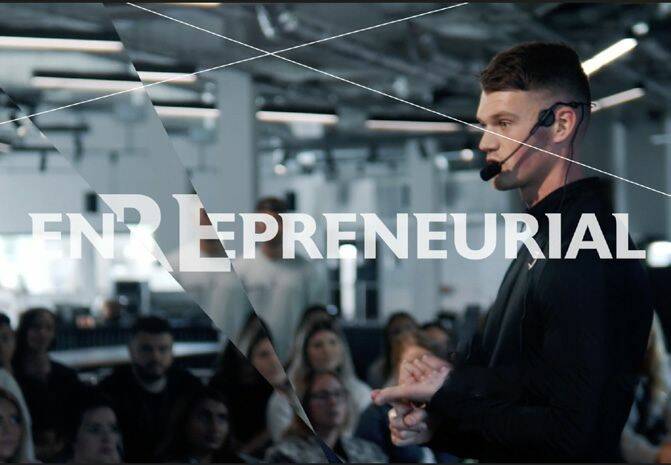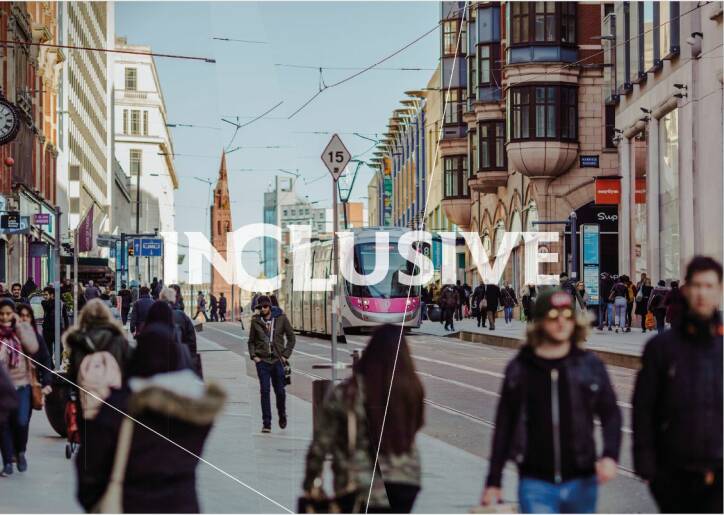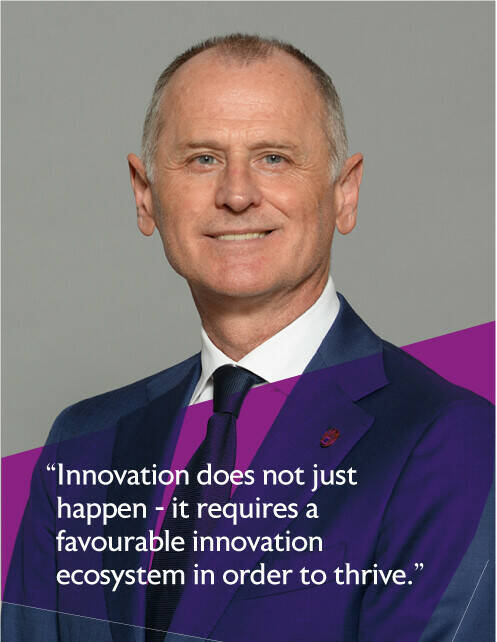

2030 Priorities and Ambition
Strategic Objectives
Foreword
Our Vision, Purpose, and Values
Navigating the Challenges
Measures of success
Securing our future
Strategic Themes




Perhaps the best example of the transformational model we have in mind is the new Aston Health Services Hub that we will establish on campus within the B-IQ, to provide integrated care for all our students and the community and drive health tech innovations. A Hub that brings together cutting-edge research in precision healthcare and digital health, clinical training and clinical trials, with embedded NHS services, tech companies and expert teams from partner organisations.
A ‘living lab’, in fact, that will bring together our diverse disciplines and teams to advance both education and research by prototyping and proofing new healthcare solutions and technologies to address the unprecedented challenges to health inequity and access to care.
A new model of university for a changing world. This is our grand challenge at Aston University.
Bring it on.
Professor Aleksandar Subic
Vice-Chancellor and Chief Executive
September 2023
And this brings me to my third and final point, our vision of Aston as a Transformational university measured by the positive impact that we achieve for our people, students, businesses and the communities we serve.
Being transformational means embedding professional practice in all our courses to drive employability and social mobility; encouraging interdisciplinary teaching and challenge-based research; developing entrepreneurs internally and externally to drive innovation and inclusive growth; facilitating a collaborative co-creation approach with industry and business focused on value realisation, embedding industry teams and professionals within the university environment; fostering lifelong connectivity with our students and expanding our international collaborations.
But most of all, this means that we will need to think and act differently, beyond the conventional boundaries of today, as we create a more agile and adaptive university, a learning organisation for the future powered by digital innovation.

We believe that successful universities of the future will foster confident and enterprising learners who are able to adapt to the changing world of work and drive innovation. Because successful graduates of the future will not necessarily emerge with all the answers, they will be prepared to ask the question, find and solve problems, be ready to take risks and pursue new frontiers and contribute to both local and global communities. Our 2030 strategy will ensure that our students are ready to tackle future challenges in work and life – because our university will be innovative, engaged and global in orientation.
We are building a digital innovation powerhouse in the heart of Birmingham – a place where digital tech and health tech, the brightest talent, most exciting businesses and cultural institutions come together to foster an environment which continually reinvents itself by harnessing fresh ideas and by pursuing game-changing innovations that make a positive impact.
Second, we will embrace our innovative past and become a truly Entrepreneurial university.
The past two decades have been witness to the most frenzied period of innovation and creativity in the history of the world. We’ve made significant strides in almost every field, driven in particular by science, technology and digital transformation. Connectivity has exponentially multiplied human progress.
But innovation does not just happen - it requires a favourable innovation ecosystem in order to thrive. This is why we are creating the Birmingham Innovation Quarter (B-IQ) here at Aston University with our partners Bruntwood SciTech, Birmingham City Council and others, and in the process redefining Aston University as an enterprising university. We are co-creating an innovation ecosystem of global significance with all the essential ingredients, to enable innovation at scale and pace, to attract enterprising talent, and create enterprising graduates – our future leaders of innovation and change.
“This means that we will need to think and act differently, beyond the conventional boundaries of today.”
“Aston University’s history is intertwined with the history of Birmingham, a remarkable city that was once the heartland of the industrial revolution and the manufacturing powerhouse of the world.”
For over a century, Aston University’s enduring purpose has been to make our world a better place through education, research and innovation, by enabling our students to succeed in work and life, and by supporting our communities to thrive economically, socially and culturally.
Born out of the First Industrial Revolution, Aston University has a proud and distinct heritage dating back to our formation as the School of Metallurgy in 1875, the first UK College of Technology in 1951, gaining university status by Royal Charter in 1966, and becoming The Guardian University of the Year in 2020.
Throughout this period Aston University’s enduring purpose has been to make our world a better place through education, research and innovation, by enabling our students to succeed in work and life, and by supporting our communities to thrive economically, socially and culturally.
Building on our remarkable past, we now ask ourselves, what is our place and role in the Fourth Industrial Revolution (and beyond) within a rapidly changing world?
Over the past year we have explored possible scenarios for our future within our city, our region, and more broadly within the national and international context. How we might navigate the challenges of economic uncertainty, the changing nature of work, business and trade due to digital transformation, digital inclusion, health inequity, climate crisis and global unrest, just to name a few. How to prepare our students for work and life, within an increasingly complex and uncertain world, and how to help our communities thrive in the face of all these challenges. Our 2030 strategy emerged from many workshops, reviews and conversations about our purpose and aspirations, changed operating environment, and the challenges and opportunities ahead.
Here, I want to highlight three things that will define our future at Aston.
First, I will explore our commitment to being an Inclusive university.
From the beginning, our founder’s dream was that Aston University would be defined not by whom we exclude but by whom we include and how they succeed. Inclusion and diversity: these two essential values go right to the heart of who we are as a university. Each and every one of us here at Aston University is unique, and we are proud of that. We come from different backgrounds and cultures, have different experiences, skills and ideas. We all belong here at Aston University, and in Birmingham, one of the most welcoming, diverse and inclusive cities on Earth.
But being inclusive requires strategy and hard work. This year we have become only the second university in the UK to achieve an Athena Swan gold in diversity award in engineering, we have renewed our Civic Agreement, actioned the Race Equality Charter and secured the University of Sanctuary status. And we are embedding intercultural awareness in all our courses across all disciplines. This forms a powerful platform for our inclusive future.
FOREWORD BY THE
VICE-CHANCELLOR AND CHIEF EXECUTIVE
Our Strategy for a Changing World


Perhaps the best example of the transformational model we have in mind is the new Aston Health Services Hub that we will establish on campus within the B-IQ, to provide integrated care for all our students and the community and drive health tech innovations. A Hub that brings together cutting-edge research in precision healthcare and digital health, clinical training and clinical trials, with embedded NHS services, tech companies and expert teams from partner organisations.
A ‘living lab’, in fact, that will bring together our diverse disciplines and teams to advance both education and research by prototyping and proofing new healthcare solutions and technologies to address the unprecedented challenges to health inequity and access to care.
A new model of university for a changing world. This is our grand challenge at Aston University.
Bring it on.
Professor Aleksandar Subic
Vice-Chancellor and Chief Executive
September 2023
“This means that we will need to think and act differently, beyond the conventional boundaries of today.”
And this brings me to my third and final point, our vision of Aston as a Transformational university measured by the positive impact that we achieve for our people, students, businesses and the communities we serve.
Being transformational means embedding professional practice in all our courses to drive employability and social mobility; encouraging interdisciplinary teaching and challenge-based research; developing entrepreneurs internally and externally to drive innovation and inclusive growth; facilitating a collaborative co-creation approach with industry and business focused on value realisation, embedding industry teams and professionals within the university environment; fostering lifelong connectivity with our students and expanding our international collaborations.
But most of all, this means that we will need to think and act differently, beyond the conventional boundaries of today, as we create a more agile and adaptive university, a learning organisation for the future powered by digital innovation.
We believe that successful universities of the future will foster confident and enterprising learners who are able to adapt to the changing world of work and drive innovation. Because successful graduates of the future will not necessarily emerge with all the answers, they will be prepared to ask the question, find and solve problems, be ready to take risks and pursue new frontiers and contribute to both local and global communities. Our 2030 strategy will ensure that our students are ready to tackle future challenges in work and life – because our university will be innovative, engaged and global in orientation.
“Aston University’s history is intertwined with the history of Birmingham, a remarkable city that was once the heartland of the industrial revolution and the manufacturing powerhouse of the world.”
Strategic Themes

2030 Priorities and Ambition
Measures of success
Securing our future
Strategic Objectives
Foreword
Our Vision, Purpose, and Values
Navigating the Challenges

Second, we will embrace our innovative past and become a truly Entrepreneurial university.
The past two decades have been witness to the most frenzied period of innovation and creativity in the history of the world. We’ve made significant strides in almost every field, driven in particular by science, technology and digital transformation. Connectivity has exponentially multiplied human progress.
But innovation does not just happen - it requires a favourable innovation ecosystem in order to thrive. This is why we are creating the Birmingham Innovation Quarter (B-IQ) here at Aston University with our partners Bruntwood SciTech, Birmingham City Council and others, and in the process redefining Aston University as an enterprising university. We are co-creating an innovation ecosystem of global significance with all the essential ingredients, to enable innovation at scale and pace, to attract enterprising talent, and create enterprising graduates – our future leaders of innovation and change.
For over a century, Aston University’s enduring purpose has been to make our world a better place through education, research and innovation, by enabling our students to succeed in work and life, and by supporting our communities to thrive economically, socially and culturally.
Born out of the First Industrial Revolution, Aston University has a proud and distinct heritage dating back to our formation as the School of Metallurgy in 1875, the first UK College of Technology in 1951, gaining university status by Royal Charter in 1966, and becoming The Guardian University of the Year in 2020.
Throughout this period Aston University’s enduring purpose has been to make our world a better place through education, research and innovation, by enabling our students to succeed in work and life, and by supporting our communities to thrive economically, socially and culturally.
Building on our remarkable past, we now ask ourselves, what is our place and role in the Fourth Industrial Revolution (and beyond) within a rapidly changing world?
Over the past year we have explored possible scenarios for our future within our city, our region, and more broadly within the national and international context. How we might navigate the challenges of economic uncertainty, the changing nature of work, business and trade due to digital transformation, digital inclusion, health inequity, climate crisis and global unrest, just to name a few. How to prepare our students for work and life, within an increasingly complex and uncertain world, and how to help our communities thrive in the face of all these challenges. Our 2030 strategy emerged from many workshops, reviews and conversations about our purpose and aspirations, changed operating environment, and the challenges and opportunities ahead.
Here, I want to highlight three things that will define our future at Aston.
First, I will explore our commitment to being an Inclusive university.
From the beginning, our founder’s dream was that Aston University would be defined not by whom we exclude but by whom we include and how they succeed. Inclusion and diversity: these two essential values go right to the heart of who we are as a university. Each and every one of us here at Aston University is unique, and we are proud of that. We come from different backgrounds and cultures, have different experiences, skills and ideas. We all belong here at Aston University, and in Birmingham, one of the most welcoming, diverse and inclusive cities on Earth.
But being inclusive requires strategy and hard work. This year we have become only the second university in the UK to achieve an Athena Swan gold in diversity award in engineering, we have renewed our Civic Agreement, actioned the Race Equality Charter and secured the University of Sanctuary status. And we are embedding intercultural awareness in all our courses across all disciplines. This forms a powerful platform for our inclusive future.
Our Strategy for a Changing World

FOREWORD BY THE
VICE-CHANCELLOR AND CHIEF EXECUTIVE